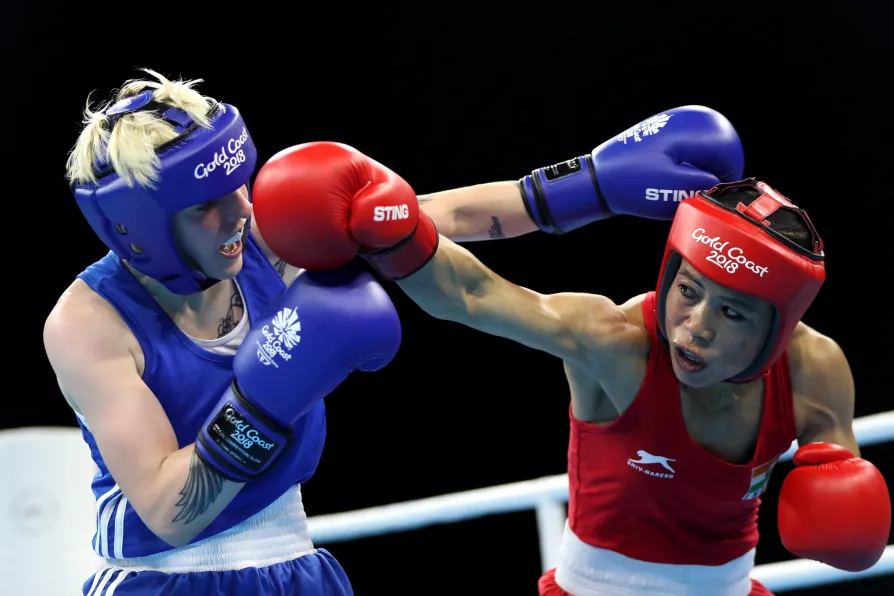Mary Kom’s fists made history in the boxing world. Malak Mesleh’s never got the chance. One story ends in glory, the other in grief — but both highlight the defiance of women who dare to fight, writes JOHN WIGHT

 Northern Ireland's Kristina O'Hara (left) in action against India's MC Mery Kom at Oxenford Studios during day ten of the 2018 Commonwealth Games in the Gold Coast, Australia
Northern Ireland's Kristina O'Hara (left) in action against India's MC Mery Kom at Oxenford Studios during day ten of the 2018 Commonwealth Games in the Gold Coast, Australia
WITH an Olympic bronze medal and six world titles to her name, India’s Mary Kom has just claim to being considered one of the best to ever do it in women’s amateur boxing.
As with so many athletes of her standing who hail from the global south, Mary Kom’s is a name and legacy that is sadly but largely unknown to the sporting public of the global north. In her case, this is a real pity, as she transcended her sport to become a cultural icon not just in India but across the entire Asian world.
Born into poverty in rural Manipur in northeastern India, Mary was a child of tenant farmers. In this life, every day is a struggle and every tomorrow a worry. An early talent and passion for competitive sports manifested in her taking up track and field at school. This was until boxing came knocking in 2000 and its lure became too strong to resist. When she entered the ring, she did against the wishes of her father in India’s male-dominated rural society. His passion for the sport overcame any and all obstacles in her path, regardless.
Kom fought throughout her amateur career at pinweight, flyweight, and light flyweight. She possessed preternatural hand-speed and reflexes, which gained her the aforementioned bronze medal at the Olympics — the 2012 games in London, to be precise.
A national heroine in India, after winning her sixth and last world amateur title in 2018 the government of Manipur awarded her the honorific title of ‘Meethoi Lima’ (woman of excellence). A street was also named after her.
After retiring from boxing in 2020, which she did after competing in the Tokyo Olympics, Mary entered politics, where different kinds of bruises await. There she prospered as an advocate for women’s participation in sport. A trailblazer for women in India and beyond, this is Mary Kom’s greatest achievement both in and out of the ring.
Another female boxer in the global south — 20-year-old Malak Meleh — had dreams of representing her people, the Palestinian people, on the world stage. Just like India’s Mary Kom, Malak wanted nothing more than to make her people proud. Her dream of doing so was cruelly and brutally crushed under an Israeli missile, which struck the beachside cafe she and others were in at the time in Gaza on June 30, this year.
Malak Meleh by all accounts was not someone who would approve of being singled out for special mention amid the countless Palestinian victims of Israel’s ongoing genocidal slaughter of her people. But her death, the manner of it, is a symbol of the human potential that has and continues to be extinguished in the name of ethno-supremacy when it enters its fascist stage.
There is video footage of Malak training with her female compatriots on the beach in Gaza with a bomb-scape of ruined buildings in the background. Said footage stands as a towering testament to the power of the human spirit, and also a withering j’accuse of a world that has sat idly by as the suffering and slaughter of an indigenous people has taken place and been live streamed.
Women’s boxing in Gaza allowed and allows girls such as Malak to believe in the future. It also acts as a mechanism by which to cope with an existence defined by the ravages of structural oppression.
Malak Mesleh was a member of Gaza’s Al-Mashtal Boxing Club, the first female-only boxing gym in Palestine. It was equipped with a full-size ring, an array of heavy bags, and its walls were festooned with posters of boxing icons, past and present. At its peak it had 40 members. Forty young women, in other words, who found community, mutuality, and something to believe in under one roof.
Al-Mashtal Boxing Club was destroyed by an Israeli air strike in the summer of 2024.
The club’s devastation did not succeed in devastating the determination of its members. This is where the beach came in. With the crashing of the waves of the Mediterranean as soundtrack, the women of Al-Mashtal forged even more meaning from their passion for boxing, exerting and pushing themselves even harder in defiance of the injustice of their material reality.
There they are on the sand, their ring a rope being held up by others, sparring and working out on the pads. In the footage, with the sun in their faces, they are more alive than they have ever been, with their minds focused on the moment to the exclusion of all else. Moments are what life has been reduced to in Gaza — moments of happiness snatched from moments of horror.
Malak Mesleh’s slaughter in Gaza by a missile manufactured on the other side of the world at the cost of a million dollars defines our world in so many different ways. She was born into poverty, but became rich in her refusal to allow material disadvantages to circumscribe her belief in what was possible.
Malak Mesleh may be dead but what she represents lives on. In a better world than this one, there would be songs written about this young girl. Maybe there will be.
There should be.

The Khelif gender row shows no sign of being resolved to the satisfaction of anyone involved anytime soon, says boxing writer JOHN WIGHT












